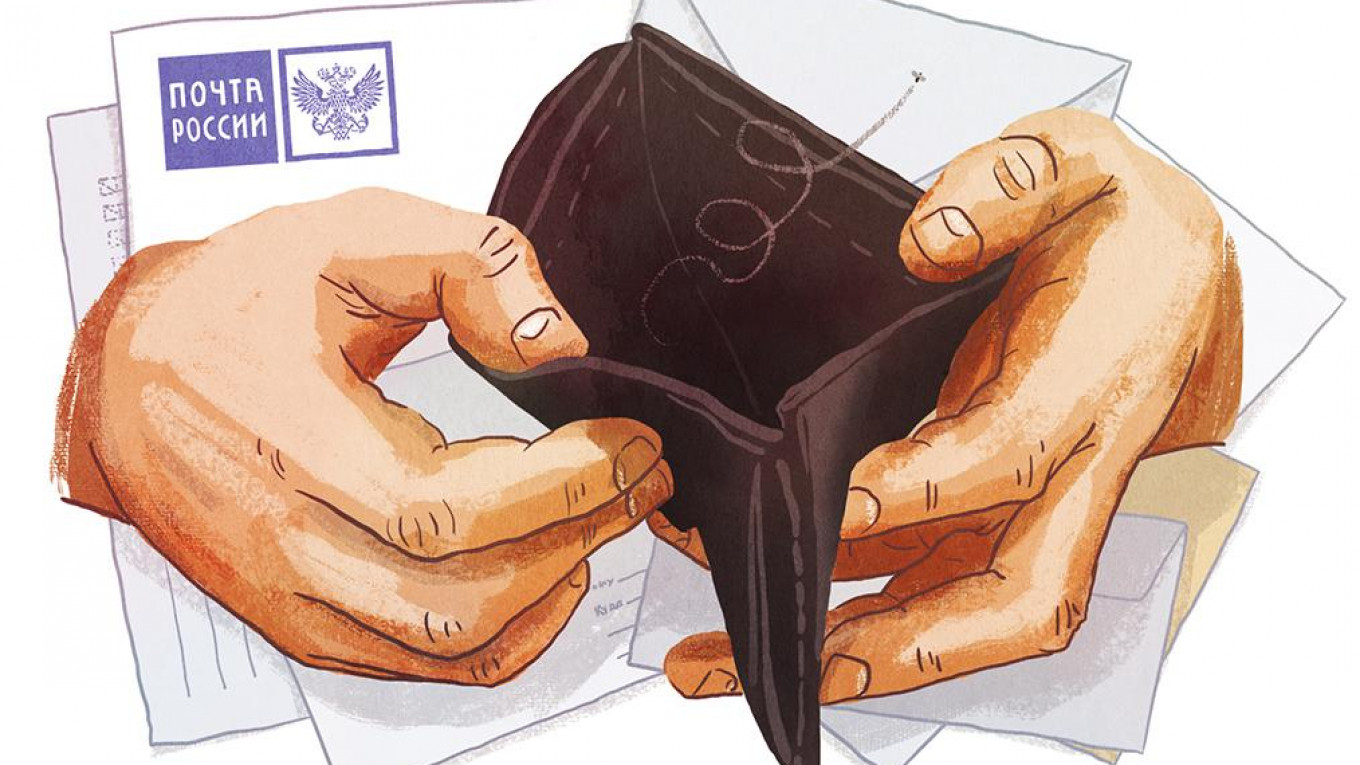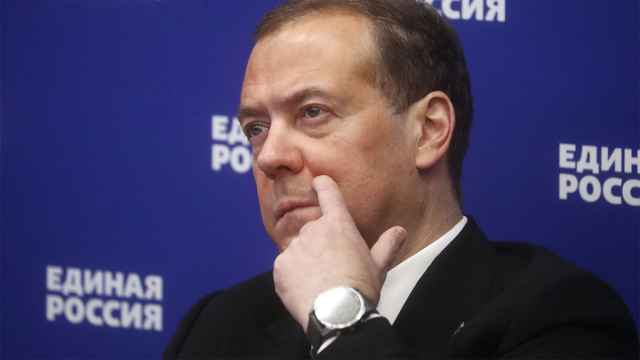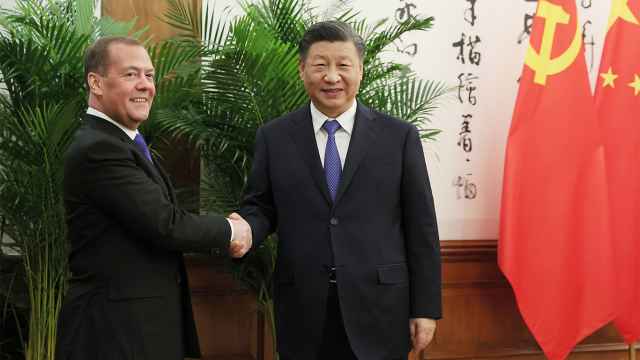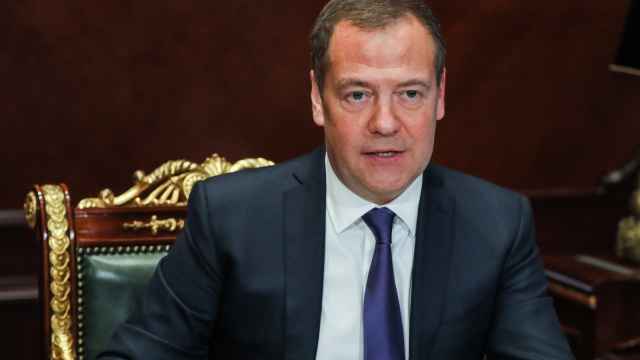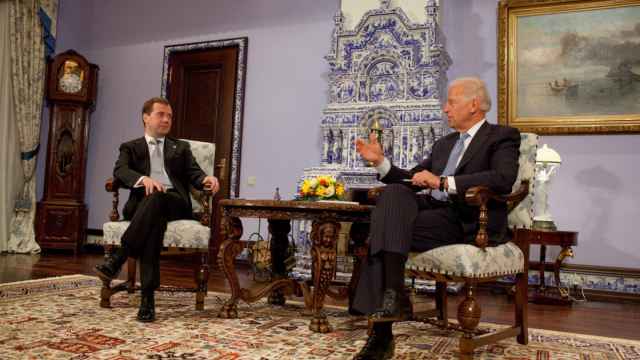The final chapter of Dmitry Strashnov’s controversial reign over Russia’s postal service ended Friday with the appointment of his successor, handpicked by Russian Prime Minister Dmitry Medvedev.
Strashnov’s ousting from Russian Post — alongside the criminal investigation into his finances — has raised eyebrows in Russia’s business community, especially given his success at the company’s helm.
Under his leadership, the bulky state-owned postal service became a competitive company and Russian Post paid out large dividends to its sole owner, the federal government.
But it was precisely Strashnov’s ambitions to modernize the country’s postal operator, and his attempts at reform, that may have precipitated his dismissal.
Vladimir Milov, Russia’s former deputy energy minister, described the former CEO’s exit as the result of a fight within the government for control over Russian Post’s increasingly lucrative assets.
“The story with Strashnov is a mirror that reflects the depravity of the model of state capitalism,’’ Milov wrote.
“For several years there’s been an aggressive bureaucratic fuss surrounding Russian Post,” economic analyst Nikita Krichyovsky told the Moscow Times. “The financial flows tied to it are huge, and any group would want control of them.”
Postal Revival
Strashnov came to Russian Post amid turbulence. His maligned predecessor, Alexander Kiselyov, was forced out over Moscow's 2013 “postal collapse,” when 500,000 international packages were left stranded in the capital’s airports.
When he took Russian Post’s top spot in April 2013, the state-owned postal service was moribund and unprofitable. But Strashnov’s track record in the private sector — heading Russian cell phone operator, Tele2; Philips Consumer Electronics; and Electrolux Home Appliances — meant he was well placed to give the company an overhaul.
Within months, Strashnov set about doubling Russian Post’s revenue in preparation for a public offering in 2018. He began shuttering loss-making postal offices, instead focusing on servicing deliveries from online retailers from abroad.
Under Strashnov, the company generated record revenues and profits.
Today, Russian Post has 42,000 post offices, servicing 6.5 million customers daily. Apart from selling stamps and sending letters, the company processes utility payments, cash transfers and consumer loans. It even sells lottery, flight and theater tickets.
By 2016, Russian Post had successfully handled 225 million international packages — twice as many as 2015 and 10 times more than 2012. Its revenues ballooned 24 percent to 165 billion rubles from 2013 to 2016, with profits soaring 72-fold to 1.7 billion rubles over the same period.
The company paid its main shareholder, the federal government, a dividend of 913 million rubles ($15 million).
Rules of Engagement
Nikolai Nikiforov, head of the Mass Media and Communications Ministry that oversees Russian Post, said the company's growing presence on financial services markets and preparations for privatization meant the time had come for a change in leadership.
“It’s important to have a CEO who has experience working for a large monopoly, as well as in the banking sector,’’ he said.
But given Strashnov’s successes at Russian Post, it is little surprise his exit was met with concern in Russia’s business community. Some of its prominent figures see an investigation into his finances as a pretext for pushing him out of the company.
The scandal began in March, when the Investigative Committee opened proceedings into whether the former CEO illegally received “salary and bonus’’ payments.
Investigators claim that Irina Lapteva, a Communications Ministry official, signed a contract in 2014 that gave Strashnov a massive one-time bonus of 95.4 million rubles ($1.58mln).
But there are those who have jumped to Strashnov's defense.
“Both the Communications Ministry's leadership and Strashnov agreed that the size of the bonus stipulated in the contract was standard,” says analyst Nikita Krichyovsky. “The fuss was deliberately exaggerated as a pretext to oust him. Everyone understood this from the very beginning.”
“Strashnov substantially improved the quality of service of what was not too long ago an awful service,” Pavel Vlasov-Mrdulyash, director of the Moscow communications and marketing company E-Generator, wrote on Facebook.
Was it fair that Strashnov, who had volunteered for the impossible task of reforming the huge, Soviet-style company, should receive a large bonus that his employer, the Russian state, had agreed on?
“As a taxpayer, my opinion is ‘yes’” Vlasov-Mrdulyash wrote. “The man did excellent work and has a right to be adequately compensated for his work — in accordance with market rates.’’
On the Defensive
In the days since his departure, Strashnov has embarked on a media offensive. In an interview with RBC, he was eager to defend his legacy at Russian Post citing modernization and new financial services as successes.
But, “the main achievement,” he said, “is that in the course of two years Russian Post is now profitable and doesn’t require state subsidies.”
In the same interview, Strashnov said it was his inability to wrangle political backing, not the investigation, that led to his exit. "I didn't have the necessary state public support and political sponsorship for the transformation of Russian Post."
But others said Strashnov should have exercised greater caution.
“A manager at a ‘state company’ should not forget that ‘state’ comes first, and ‘company’ comes second place,” Sergei Aleksashenko, former deputy chairman of Russia's Central Bank, told The Moscow Times. “This segment of the economy has its own rules of engagement.’’
Having worked at the Finance Ministry and Economic Development Ministry, Nikolai Podguzov may be more attuned to those rules of engagement. Another former employer, the Kremlin-connected VTB Bank, lobbied hard to put him in charge at Russian Post.
Citing an anonymous source close to the presidential administration, the Kommersant newspaper reported that Podguzov was the “compromise candidate,’’ satisfactory to all major special interest groups.
“The story behind Strashnov’s unprecedented bonus and the appointment of someone from the Economic Development Ministry,” says Krichyovsky, “symbolizes the victories of finance-bank groups associated with people [linked to government] like Alexei Kudrin, Elvira Nabiullina and German Gref.”
As parting advice to Podguzov, Strashnov said the company must continue to modernize and adapt to market demands. It should capitalize on Russia being a bridge between Asia and Europe, he said, citing plans for a regular postal route between Beijing, Moscow and Berlin.
“Russian Post exists today in a highly competitive environment with a large number of private companies, including foreign ones, who are active on our domestic market," Strashnov said. "It’s imperative that we act and think in a market way.’’
A Message from The Moscow Times:
Dear readers,
We are facing unprecedented challenges. Russia's Prosecutor General's Office has designated The Moscow Times as an "undesirable" organization, criminalizing our work and putting our staff at risk of prosecution. This follows our earlier unjust labeling as a "foreign agent."
These actions are direct attempts to silence independent journalism in Russia. The authorities claim our work "discredits the decisions of the Russian leadership." We see things differently: we strive to provide accurate, unbiased reporting on Russia.
We, the journalists of The Moscow Times, refuse to be silenced. But to continue our work, we need your help.
Your support, no matter how small, makes a world of difference. If you can, please support us monthly starting from just $2. It's quick to set up, and every contribution makes a significant impact.
By supporting The Moscow Times, you're defending open, independent journalism in the face of repression. Thank you for standing with us.
Remind me later.


